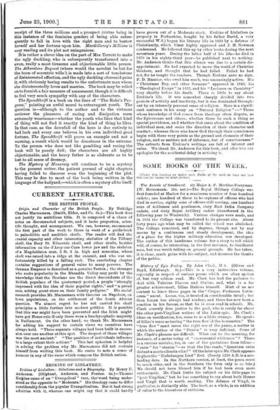CURRENT LITERATURE.
THE BRITISH PEOPLE.
Origin and Character of the British People. By Nottidge Charles Macnamara. (Smith, Elder, and Co. 6a.)—This book does not justify its ambitious title. It is composed of a chaos of notes on disconnected subjects, and it lacks proportion, scien- tific thought, and arrangement. We can, however, recommend the first part of the work to those in want of a guide-book to palreolithic and neolithic skulls. The reader will find the cranial capacity and other interesting statistics of the Tilbury skull, the Bury St. Edmunds skull, and other skulls, besides information on the d'Arcy-enr-Care lower jaw and the skeleton of a Magdal6nien man, 5 ft. 3 in. high and muscular, whose skull was raised into a ridge at the summit, and who was un- fortunately killed by a falling rock. The concluding chapter contains suggestions of general value to many persons. The German Emperor is described as a genuine Teuton ; the stranger who seeks popularity in the Rhondda Valley may profit by the knowledge that the Iberians are the direct descendants of the British populace of the quaternary period, a people "strongly impressed with the idea of their popular rights," and "a proud race, setting great store on their family pedigree." His racial research provides Mr. Macnamara with theories on Napoleon, on town populations, on the settlement of the South African question. We almost regret he has not carried his skull principles a little further into modern politics. It is possible that this war might have been prevented and the Irish might have got Home-rule if only there were a brachycephalic majority in Parliament. On the other hand, we thank Mr. Macnamara for adding his support to certain views we ourselves have always held. "Three separate villages had been built in succes- sion over one another at this spot. The deepest of these villages was the most ancient." "The qualities of individuals influence to a large extent their actions." This last aphorism is helpful in solving the problem why Mr. Macnamara did not restrain himself from writing this book. He omits to note a sense of humour in any of the races which compose the British nation.


































 Previous page
Previous page